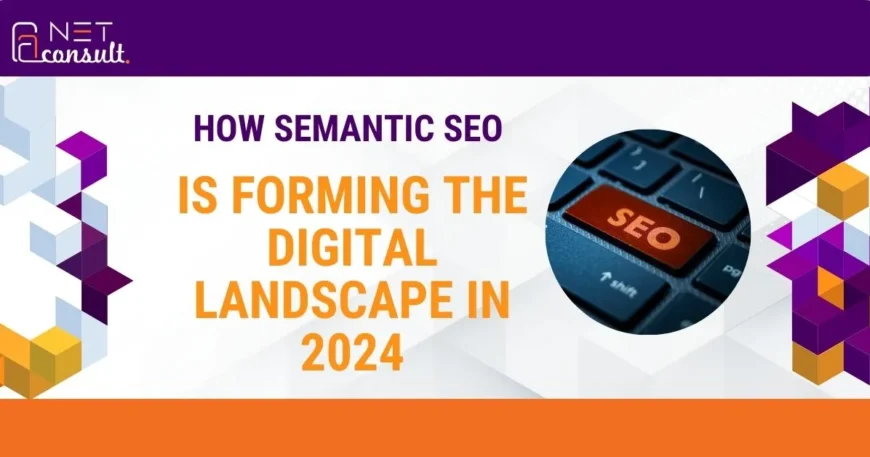At NetConsult, the foremost SEO agency in Dubai, Semantic SEO is reforming how search engines decipher and rank substances. This approach rises above customary keyword stuffing, focusing on the more profound implications behind words and expressions. By expecting to grasp client goals, context, and the connections between ideas, Semantic SEO guarantees content is more critical and open. Utilizing the force of standard language processing (NLP) and machine learning, this innovative strategy fundamentally conveys more precise query items.
The Advancement of Search Engines
From Keywords to Context
In the beginning of web search tools, positioning was about matching definite keywords. This strategy frequently prompted unfortunate client experiences as the substance did not match the client’s plan. Today, search engines like Google utilize modern algorithms to comprehend the unique situation and expectations behind an inquiry question. This shift is an immediate consequence of progressions in semantic pursuit innovation.
Google’s Algorithm Updates
Google’s various algorithms refresh, like Hummingbird, RankBrain, and BERT, highlight the significance of semantic search. Hummingbird presented a more refined approach to figuring out the context of inquiries, while RankBrain brought machine learning into the general mishmash, empowering Google to decipher complex questions more. BERT (Bidirectional Encoder Representations from Transformers) further upgraded Google’s capacity to comprehend the subtleties of language, making semantic SEO more essential than at any other time in recent memory.
Critical Parts of Semantic SEO
Entity-Based Search
Entities are the foundation of semantic pursuit. An entity can be an extraordinarily recognizable individual, spot, thing, or idea. Entity-based search assists search engines with grasping the connection between various snippets of data, giving more important outcomes. For example, while looking for “Apple,” the web search must decide if the client is searching for a natural product or a tech organization. Semantic SEO (Search engine optimization) explains this uncertainty.
Information Graphs
Information charts are significant in semantic SEO (Search Engine Optimization). They interface various elements and give web search tools an immense organization of related data. Google’s Information Graphs are a perfect representation, upgrading indexed lists with rich associated bits and points that offer a more profound comprehension of the question.
Latent Semantic Indexing (LSI)
Latent Semantic Indexing (LSI) is a strategy that assists search engines with understanding the setting of content by recognizing designs in the connections among terms and ideas. LSI keywords are semantically connected with the essential keywords and assist with looking through motors to convey more precise outcomes. Integrating LSI Keywords into your substance can fundamentally affect its importance and positioning potential.
Executing Semantic SEO in Your Technique
Content Optimization
Creating content with semantic SEO (Search Engine Optimization) requires a shift from keyword-centered to topic-centered approaches. Focus on making exhaustive, great content that covers all parts of a point. Use composition markup to give extra context to search engines, assisting them with grasping the construction and importance of your substance.
Client Plan and Search Questions
Understanding client aims is vital. Lead careful examination to figure out the thing clients are searching for and tailor your substance to address those issues. Use tools like Google Analytics and Google Search Console Center to break down search questions and distinguish designs in client conduct. Creating content that lines up with client goal will further develop commitment and improve the probability of higher rankings.
Internal Linking Structure
An efficient internal linking structure is fundamental for semantic SEO. Internal linking assists with looking through motors, exploring your site, and figuring out the connection between various pages. Utilize distinct anchor text that incorporates pertinent keywords to build up the semantic associations inside your substance. This training helps with SEO (Search engine optimization) and upgrades the client experience by giving simple admittance to related data.
The Advantages of Semantic SEO
Further developed Search Rankings
By focusing on the significance behind the substance, semantic SEO assists search engines with conveying more precise and important outcomes. This approach can prompt higher rankings, as web search tools focus on satisfying that best match client aim.
Upgraded Client Experience
Semantic SEO further develops the general client experience by furnishing content that is more in line with clients’ needs. These prompts expanded commitment, lower bounce rates, and higher coverage rates.
Futureproofing Your SEO Strategy
As web search tools continue to develop, semantic SEO will become progressively significant. By taking on these practices now, you can future-proof your SEO strategy and remain in front of the opposition. Putting resources into semantic SEO (Search engine optimization) guarantees that your substance stays applicable and viable in the long-term
Checking and Adapting to Trends
The advanced scene is constantly developing, making it essential to remain refreshed with the most current trends and calculation changes. Consistently observing our site’s exhibition and adapting our systems considering information and experiences guarantees supported outcomes in search rankings.
Examination and Detailing
Utilizing tools like Google Analytics and Search Console assists us with following key metrics, such as natural traffic, bounce rate, and client conduct. These bits of knowledge empower us to refine our substance technique and improve for better execution.
Ceaseless Improvement
Semantic SEO is not a one-time exertion but a continuous interaction. Consistently refreshing and growing our substance to reflect the latest things and client interests guarantees that our site stays pertinent and definitive.
Embracing the Future with Semantic SEO
Semantic S’s meaning could not be more significant as we explore the quickly developing digital landscape of 2024. By shifting our concentration from simple keyword advancement to figuring out the more profound implications, settings, and connections between ideas, we are making way for more precise, applicable, and easy-to-use search encounters.
Implementing semantic SEO strategies—, for example, entity-based search, utilizing information graphs, and using inactive semantic ordering—guarantees that our substance positions higher and resounds more profoundly with our crowd. This approach further develops search rankings, upgrades client experience, and future-verifies our SEO endeavors against the persistent headway in search engine algorithms.
At NetConsult, the foremost SEO agency in Dubai, we are focused on assisting you with remaining on the ball. By getting it and implementing these high-level SEO strategies, you can guarantee that your substance stays important, drawing in, and compelling when gathering the client’s aim.





